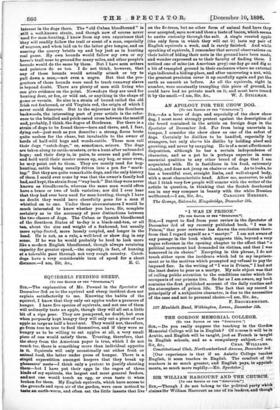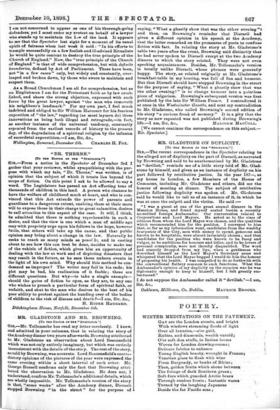SIR WILLIAM HARCOURT AND THE CHURCH. [TO THE EDITOR OP
THE " Einccteros.”] SIR,—Though I do not belong to the political party which claims Sir William Harcourt as one of its leaders, and though I am not concerned to appear as one of his thorough-going defenders, yet I must enter my protest on behalf of a lawyer who stands up to maintain the 1.w of the land. It appears to me that the Spectator lost sight for a moment of its usual spirit of fairness when last week it said : "In his efforts to trample successfully on a few foolish and ill-advised Ritualists be would be quite content to destroy the true principle of the Church of England." Now, the "true principle of the Church of England " is that of wide comprehension, but with definite boundaries, defined by Act of Parliament. These have been, not "in a few cases" only, but widely and constantly, over- leaped and broken down, by those who swore to maintain and respect them.
As a. Broad Churchman I am all for oomprehension, but as an Englishman I am for the Protestant faith as by law estab- lished, and share the strong objection, expressed with such force by the great lawyer, against "the man who removeth his neighbour's landmark." For my own part, I feel much indebted and obliged to Sir William Harcourt for his fearless .exposition of "the law," regarding (as most laymen do) these innovations as being both illegal and retrograde,—in fact, as another instance of the universal tendency, constantly repeated from the earliest records of history to the present day, of the degradation of a spiritual religion by the infusion of sacerdotal superstition.—I am, Sir, &c.,
Wellington, Somerset, December 5th. CHARLES H. Fox.











































 Previous page
Previous page